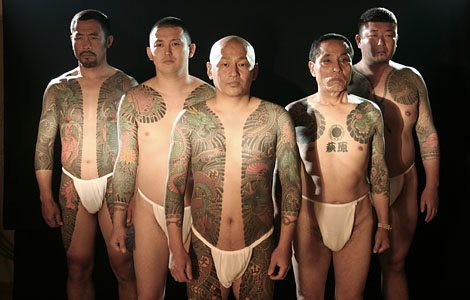Like this post? Help us by sharing it!
So you want to travel to Japan but – uh-oh – you’ve read in the forums that tattoos are a no-go. Thanks to that ill-advised tribal you got when you were seventeen you’re going to be banned from swimming pools, hot springs and waterparks and kicked out of shops, hotels and restaurants. But you’ve already bought your plane ticket! What are you going to do?!

Well, don’t panic just yet.
Tattoos are indeed something of a taboo in Japan. The reason is simple: for many years, tattoos = yakuza, and yakuza = criminal.

Some history
To give a bit of background on the matter, Chinese records dating back thousands of years indicate that tattooing might have been a part of Japanese culture since the Jomon Period (12,000-300 BC).
Later in history, however, tattooing seems to have gained a certain level of stigma – probably beginning when the Japanese began tattooing criminals to mark them out as offenders. However it wasn’t until the mid-19th century, when Japan finally ended its long period of isolation, that they were banned altogether.
As Kotaku reports, this is because the Japanese government was worried that the practise of tattooing might be seen as barbaric by the outside world, exposing the Japanese to ridicule at a time when they wanted very much to be taken seriously. Though this ban was lifted after World War II, it was by then too late for the stigma to be reversed.

The yakuza, often called the “Japanese mafia”, have their roots in the Edo Period (1603-1868) and traditionally sport full-body tattoos, called irezumi. The associative links between tattoos and crime thus remain very strong in Japan, and even though the popularity of tattoos has increased in recent years due to Western influence (especially amongst the Japanese youth), your ink is likely to draw a few disapproving stares!
Will my tattoos be a problem for me in Japan?
Not necessarily. Opinions are steadily changing, and the majority of Japanese people are now aware that tattoos are much more acceptable abroad than they are at home. You will even see young Japanese people with discreet tattoos out and about in Tokyo, Osaka or indeed any Japanese city. Nonetheless, hundreds of years of stigma are not easily forgotten (as recently as 2012, for example, the mayor of Osaka launched a controversial campaign to force employees of the city to declare their tattoos to their employer) – so to avoid causing offence we recommend covering up your tattoos if you can.
Places where your tattoos may well be an issue are in hot springs (onsen), on beaches, at theme parks, at water parks and in swimming pools. It is still the norm at these establishments to ban tattoos entirely, and where a ban exists you will see prominent signs informing you of it.

If you have a very small tattoo, it will most likely go unnoticed in most onsen (I have a tiny tattoo on my back, and have never been asked to leave a hot spring in Japan). Still, if you can cover your ink with a plaster or a bandage, you should probably do so just to be on the safe side.
If you are heavily tattooed, however, or have a tattoo that’s too large to cover – it is pretty likely that you may be asked to leave by staff.
But that’s not fair! I was looking forward to my first onsen experience…
Yes, it does suck. Especially because these bans usually only affect foreigners and those who obviously have no connection with organised crime. (If a real yakuza member walked into an onsen or a swimming pool, would you want to be the one to ask them to leave?).
Nonetheless it is a fact of Japanese culture, and there’s not much you can do about it. If you are heavily tattooed and would like to have an onsen experience (and we do highly recommend it!), we suggest booking a stay at a Japanese inn with private rotenburo baths, or where the communal baths may be booked out for private use. Alternatively, when my (heavily tattooed) brother came to visit me in Japan, he found that visiting the ryokan’s onsen late at night when most visitors had gone to bed was a great solution.
Meanwhile, if you’re feeling very bold, there are also bathhouses throughout Japan that cater specifically to yakuza members – though we certainly won’t be recommending any of those!

STOP PRESS –
Highend Hoshino Resorts, who run a number of beautiful ryokan across Japan, have recognised the problem with Japanese perceptions of tattoos and the fact that many foreigners have them. It was announced the other day that Hoshino Resorts would allow guests to bathe in the hot spring baths, so long as their tattoo could be covered by a 8 x 10 cm white sticker. Is this the start of a changing in attitudes?


